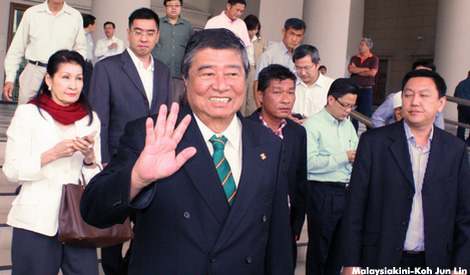Editor’s note: This is the 11th of a 12-part series from former health minister and MCA president Chua Soi Lek’s book, ‘Like Me or Hate Me: Rising from the Political Ashes’.
BOOK EXCERPT | This chapter contains my thoughts on issues primarily of relevance to the Chinese community.
Suqiu and the 17-point Election Appeal
On 10 August 1999, the Dong Jiao Zong (the United Chinese School Committees’ Association of Malaysia and United Chinese School Teachers’ Associations of Malaysia) joined with the KL-Selangor Chinese Assembly Hall to draw up an important memorandum.
The document, which came to be known as Suqiu (Malaysian Chinese Organisation Election Appeals Committee), was subsequently endorsed by more than 2,000 other Chinese associations in August 1999.
To be fair, the Suqiu cannot be regarded as promoting Chinese interests to the exclusion of other races. Many of the principles it advocated were of universal values that cut across race and religion.
These included good governance, human rights and justice, a crackdown on corruption, the repeal of the Internal Security Act (ISA), press freedom, the eradication of poverty irrespective of race, and a review of the government’s privatisation policy.
But there were also many demands that were aimed at redressing grievances specific to the Chinese community.
It referred, for example, to the need to develop Chinese education (including providing Chinese schools with adequate funding), and improve Chinese new villages.
The document also advocated the abolishment of the long-standing official distinction between Malays and non-Malays and advocated basing affirmative action policies on needs rather than on race.
It also wanted promotion in the government service to be based on meritocracy rather than race and religion.
The fact that the Suqiu was announced just months before the general elections created a lot of excitement within the Chinese community.
So much so that the MCA, Gerakan and SUPP – the three Chinese-based parties in the Barisan Nasional coalition – felt they had little choice but to support it.
Almost immediately, there were protests from Umno Youth, Malay NGOs and the Malay press.
These critics alleged that the Suqiu threatened Malay special rights. The Federation of Peninsular Malay Students (Gabungan Pelajar Melayu Semenanjung or GPMS) responded by drawing up 100 demands focusing on Malay interests.
In reality, however, Suqiu never questioned Malay special rights. Instead, it focused on excesses identified during the implementation of the New Economic Policy.
Suqiu was subsequently discussed in the cabinet. According to MCA president Dr Ling Liong Sik (photo), none of the demands in the document were rejected outright.

Instead, the cabinet decided that Ling should look into its demands. As a result, Suqiu generated a lot of hope and expectation within the Chinese community.
When the general elections were held on 29 November 1999, the contents of the Suqiu document and the sensational events following the sacking of Anwar Ibrahim created a lot of uncertainty.
Apart from a promise that the MCA president would look into them, the demands listed by Suqiu were never addressed. However, the Reformasi movement and the huge street demonstrations associated with it in Kuala Lumpur generated a lot of media attention.
Soon, the Chinese began to fear that these demonstrations would get out of hand and take on racial overtones.
As a candidate in the election, however, I was more worried that Anwar’s supporters in Umno will not support Barisan Nasional candidates. Fortunately, the Chinese community gave overwhelming support to MCA and Gerakan candidates.
Umno candidates, on the other hand, suffered as the Anwar factor caused Malay voters to reject the party. It was largely thanks to Chinese support that the Barisan Nasional was able to retain the coveted two-thirds majority in Parliament.
After the 1999 election, however, the Chinese community became frustrated and disillusioned with both Mahathir and Ling. This was because they appeared to be backtracking on what they said before election about Suqiu.
In fact, Mahathir subsequently likened the supporters of the Suqiu document to the communists who attempted to destroy the country soon after independence.
Ling advised the Chinese community to listen to Mahathir because he was an experienced and wise leader. But the Chinese community was also upset with MCA. Having supported Suqiu before the election, the party had sung a different tune soon afterwards...

